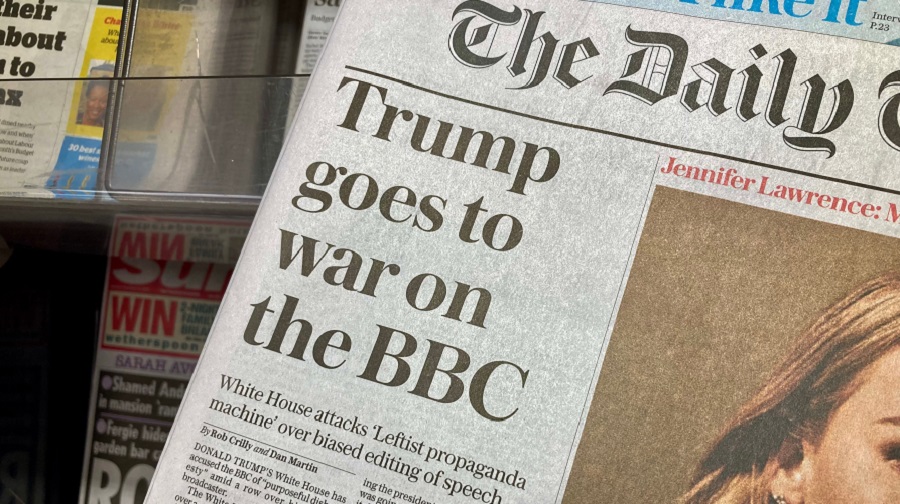
NEW YORK, NY – The BBC is facing one of the most serious crises in its recent history after acknowledging a documentary broadcast on its “Panorama” program edited a speech by Donald Trump in a way that mis-led viewers and gave the impression he issued a direct call to violence. The episode, titled Panorama: “Trump: A Second Chance?”, aired in October 2024, just ahead of the U.S. presidential election.
According to a leaked internal memo from a former BBC standards adviser, the documentary spliced together two distinct parts of Trump’s January 6 2021 speech; portions spoken roughly 50–60 minutes apart without indicating the separation. The combined clip made it appear that Trump said:
We’re going to walk down to the Capitol … and we fight. We fight like hell and if you don’t fight like hell, you’re not going to have a country anymore.”
The memo argues that this edit misled viewers because it omitted earlier portions in which Trump urged his supporters to make their voices heard “peacefully and patriotically”.
What Trump Actually Said
“We’re going to walk down … and I’ll be with you. We’re going to walk down to the Capitol — and we’re going to cheer on our brave senators and congressmen and women, and we’re probably not going to be cheering so much for some of them.”
I know that everyone here will soon be marching over to the Capitol building to peacefully and patriotically make your voices heard.”
Reiss Center on Law and Security at the New York University School of Law
Timeline of Key Events
- October 2024: Panorama airs the episode in question.
- January 2025: The BBC’s Editorial Guidelines & Standards Committee (EGSC) reportedly first raised concerns internally about the editing.
- June 2025: The internal standards adviser, Michael Prescott, leaves the role and submits a detailed 8,000-word memo to the BBC board alleging systemic bias across multiple areas-U.S. election coverage, Gaza, trans rights and more.
- Early November 2025: The memo is leaked publicly. Questions mount about the edit and broader governance of the BBC.
- November 9, 2025: BBC Director-General Tim Davie and Head of News Deborah Turness announce their resignations amid the crisis.
- November 13, 2025: The BBC issues a formal apology to Trump, stating the edit was an “error of judgment” but rejecting his defamation claim.
What the BBC Has Admitted and What It Has Refused
In its public response, the BBC acknowledged that the way the clip was edited “gave the impression that President Trump had made a direct call for violent action”. The broadcaster also confirmed it would not rebroadcast the documentary in its current form.
However, the BBC has rejected the legal basis for Trump’s threatened lawsuit. In its statement, the BBC said it saw “no basis for a defamation claim”.
Broader Allegations of Editorial Bias
Beyond the specific Trump-speech edit, the leaked memo alleges a much wider pattern of editorial bias at the BBC. Some of the key claims:
- That the BBC’s Arabic-language service exhibited “significantly different tone, headlines and emphasis” compared with English-language output-especially around the Israel–Hamas war.
- That stories raising “difficult questions” about transgender rights were often overlooked or one-sided.
- That the BBC under-covered immigration stories and over-emphasised certain themes of racism based on superficial data.
The memo argues these were not isolated incidents but structural issues that had not been properly addressed.
Implications and Next Steps
The fallout from this controversy is multifaceted:
- Trust and Reputation: The BBC’s role as a public-service broadcaster depends heavily on its perceived impartiality. The publication of the memo and the high-profile resignations have significantly shaken that perception.
- Governance & Oversight: Questions are now being asked about how the BBC handles internal concerns, how Board members intervene (for instance, a board member with political ties is cited in some sources), and whether editorial checks are fit for purpose.
- Legal Exposure: Trump’s team has threatened up to $1 billion in damages. Although the BBC disputes the claim, the legal process could be long and costly.
- Funding & Charter Review: In the U.K., the BBC’s licence-fee model and upcoming charter renewal will now take place in this climate of scrutiny. Some politicians already say the broadcaster must be “held to account”.
What began with a specific editorial decision in a single documentary has escalated into a crisis of confidence for the BBC. The organization admits it made a serious error in how it edited the Trump speech, but it resists characterising the incident as the symptom of a broader institutional failing-even as the leaked memo suggests otherwise. How the BBC rebuilds trust, revises its governance, and responds to the broader allegations will determine whether this episode becomes a turning-point or another episode in its long history of controversy.
Unlike media organizations in the United States that benefit from explicit constitutional protections under the First Amendment, the BBC operates within a fundamentally different legal framework. In the UK, there is no constitutional guarantee of press freedom, and the broadcaster is regulated through statutory law, common law, and government-approved structures like its Royal Charter. While journalistic independence is expected, the BBC is also publicly funded and subject to oversight by both Ofcom and Parliament. Additionally, British defamation laws place a greater burden on publishers to defend their reporting-making the legal and regulatory environment for the BBC much stricter than the First Amendment protections enjoyed by American media outlets.
Constitutional Protections: U.S. vs. UK Media
| Aspect | United States (e.g., CNN, Fox, NY Times) | United Kingdom (e.g., BBC) |
|---|---|---|
| Legal Foundation | First Amendment (freedom of speech and press) | No equivalent constitutional guarantee — protections governed by common law, Parliament, and regulatory frameworks |
| Government Funding / Structure | Mostly private media; free from direct government funding | Publicly funded through a television license fee; chartered and regulated by the government |
| Editorial Independence | Broad protections against government interference | Expected to be impartial, but subject to oversight by Ofcom, Parliament, and its own charter rules |
| Defamation Laws | Plaintiff must prove actual malice in public-figure cases | Defamation laws stricter — burden often shifts to the publisher to prove what it published was true |
| Legal Recourse Against Media | Higher bar for lawsuits due to First Amendment; more protection for “speech” | Lower bar for claimants, particularly public figures; BBC can be held liable more easily under UK’s defamation law |
| Regulatory Body | No federal regulator for content (FCC deals with broadcasts, but not editorial content) | Ofcom regulates broadcast content; BBC also governed by its Royal Charter and Framework Agreement |
This situation could be extremely damaging to the BBC’s legal defense if Donald Trump moves forward with a defamation lawsuit-especially in a UK court-because of several compounding factors:
1. No First Amendment Shield
In the United States, defamation cases involving public figures like Trump require a plaintiff to prove actual malice-that the media knowingly published false information or did so with reckless disregard for the truth. In the UK, however, the burden is largely on the defendant to prove the truth of what was broadcast, and the legal framework is generally much more plaintiff-friendly. The BBC can’t fall back on constitutional protections equivalent to the First Amendment, which limits their legal latitude.
2. Documented Admission of Error
The BBC has already admitted error by acknowledging that the edit gave an “incorrect impression.” Even if unintentional, this admission provides Trump’s legal team with a strong foundation to argue that the broadcast was misleading and damaging to his reputation-especially since the content concerned an event as sensitive as January 6.
3. Evidence of Systemic Issues
The leaked internal memo, which alleges “serious and systemic” bias across the organization-including in coverage of U.S. politics-may further weaken the BBC’s defense by suggesting the Trump edit was not an isolated issue but part of a larger editorial problem. Such claims could bolster accusations of intentional harm or negligence.
4. Amplified Harm Due to BBC’s Public Role
Because the BBC is a globally recognized public service broadcaster, errors like this carry substantial weight. Any misrepresentation-especially involving a politically explosive figure like Trump-can be argued to cause greater reputational harm than similar content from a smaller or opinion-driven media outlet.
Low Tolerance in UK Courts for Misleading Edits
UK courts take editorial accuracy seriously. Cases involving contextual editing or misleading juxtapositions—especially involving political speeches—have previously resulted in costly judgments against broadcasters. If the court determines that the BBC’s edit changed the meaning in a material way, damages could be significant.
As the BBC works to contain the fallout from this controversy, the legal and reputational risks continue to grow. Trump’s legal team has indicated they are weighing every option, and any formal defamation suit-particularly in the UK’s stricter legal environment-could expose the broadcaster to serious financial and editorial scrutiny. Beyond the immediate legal stakes, the episode has reignited long-standing debates about media trust, journalistic impartiality, and the real-world consequences of editorial decisions in an era where political narratives are fiercely contested.
Trump has shown an increasing ability to prevail in legal battles against media organizations, an outcome that has both energized his supporters and alarmed traditional news outlets. Recent court victories have allowed him to position himself as a challenger to what he often calls “fake news,” and in several high-profile cases, claims that once seemed unlikely have progressed far enough to force settlements, retractions, or costly legal defense efforts. If the BBC case proceeds, it will unfold against this backdrop-at a time when media accountability and defamation law are being tested in unprecedented ways. For the BBC, past precedent is a reminder that underestimating Trump’s legal strategy could be a costly miscalculation.


